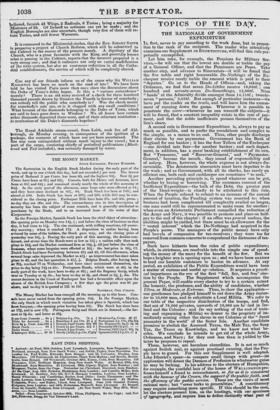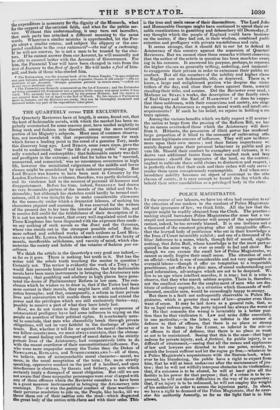TOPICS OF THE DAY.
THE RATIONALE OF GOVERNMENT EXPENDITURE r Is, first, never to pay according to the work done, but in propo- thin to the rank of the recipient. The reader who attentively examines our Supplement on EXPENDITURE, will find this rule per- petually exemplified. Let him take, for example, the Pensions for Military Ser- vices —he will see that the lowest are double or treble the pay of a:General Officer, and that the Pensioners are Peers. Take another step, and advance to Sinecurists—it will be found that the five noble and right honourable Do-Nothings of the Ex- chequer receive nearly treble the amount which is paid to their " deputes." Go on to the Heads of Offices—and, taking the Ordnance, we find that seven Do-Littler receive 10,000/. ; one hundred and seventy-seven Do-Somethings, 52,000/. Nine " heads" at the Admiralty divide amongst them 14,1504.; twenty- seven " persons," 9,930/. But enough of particular instances—we have put the reader on the trails, and will leave him the amuse- ment of running down the game. Wherever it is possible to penetrate the cover—whenever he can unearth the subjects—it will be found, that a constant inequality exists in the rate of pay- ment, and that the noble inefficients possess themselves of the lion's share.
A second rule in Government Expenditure is, always to pay as much as possible, and to prefer the roundabout and complex to the simple, as a means to an end. Thus, other people discharge their claims by one paymaster. Government has the Bank of England for one banker ; it has the four Tellers of the Exchequer —one divided into four—for another banker ; and each depart- ment, in addition, has a quasi banking establishment of its own. But "Treasurer," and "Receiver-General," and "Paymaster- General," become the mouth. they sound of responsibility and of salary. Here, however, the whole expense is not always dis- coverable. The Aristocratic sinecurists must have deputies to do the work; and as Government, with all its checks, has rarely an efficient one, both cash and cashkeeper are sometimes "to seek."
Another pervading principle is, to spend whatever can be got, whether by taxing or borrowing. The enormous amount of the Inefficient Expenditure—the bulk of the Debt, the greater part of the Dead-weight—is chiefly to be attributed to this rule. When the People refused to submit to an increase of the annual amount of taxation, the Funding system was resorted to: when. business had been cemplicated till complexity availed no longer, one man could still be superannuated to make room for another: when even an Aristocratic Parliament compelled the reduction of the Army and Navy, it was possible to promote and place on half- pay to the end of the chapter: if an office was proved useless, the abolition might be yielded, but there must be an allowance for the "vested interest" which the Do-Nothings had acquired in the People's purse. The managers of the public money have only had bowels of compassion for tax-receivers ; they were too far removed from common concerns to comprehend the distresses of tax- payers.
Such have hitherto been the rules of public expenditure; which, in strictness, are resolvable into the simple one of spend- in the money of the many for the benefit of the few. But we hope a brighter mra is opening upon us ; and we have been anxious to lend our humble assistance to hasten its advance. At any period, an exhibition of the Public Expenditure would have been a matter of curious and useful spc-culation. It acquires a practi- cal importance on the eve of the first "full, fair, and free elec- tion by the People. The Supplement which accompanies the present Paper, will enable every elector to try to a certain extent the honesty, the prudence, and the ability of candidates, whether Ultra, or Moderate, or Extreme. Thus, to show the application— one gentleman has pledged himself to cut down the Army instan- ter to 10,000 men, and to substitute a Local Militia. We refer to our table of the respective distribution of the troops, and find, that out of 76,000 privates, upwards of 50,000 are lor^.ted in Ire- land and the Colonies : and (to say nothing of the cost of train- ing and organizing a Militia) we demur to the propriety of im- mediately arming either the slaves in our Colonies or the " finest peasantry in the world" of the Sister Isle. Another candidate promises to abolish the Assessed Taxes, the Malt Tax, the Soap Tax, the Taxes on Knowledge and we know not what be- sides. We conclude he intend; to get rid of the whole Army, Ordnance, and Navy; for they cost less than is yielded by the taxes he proposes to repeal. These, however, are harmless absurdities. It is not so much against foolish zeal, as against practised cunning, that the Peo- ple have to guard. For this our Supplement is well adapted. Like Ithuriefs spear—to compare small things with great—its application will detect the Daemon of Profusion in whatsoever guise he may be lurking. In his address to the electors of Hampshire, for example, the youthful heir of the house of WELLINGTON pro- fesses himself a friend to retrenchment, so far as it is consistent with the honour of the Crown, the support of thepublic faith, and the eficiency of the public service. These are the views of most rational men; but error lurks in generalities." A constituency may require something more specific. If this should be the case, let the electors present him, on the hustings, with our specimen of typography, and require him to define distinctly what part of the expenditure is necessary for the dignity of the Monarch, what for the support of the national faith, and what for the public ser- vice. Without this understanding, it may turn out hereafter, that each party has attached a different meaning to the same words. Wherever a similar mistake is apprehended, let the Peo- ple adopt a similar course, and subject the slippery or the sus- pected candidate to the crux rationarii*—the test of a reckoning. If he will not answer, he is not a man to be trusted by the elec- tors. If he cannot answer from our Account, he will assuredly not be able to succeed better with the Accounts of Government. For him, the Financial Year will have been changed in vain from the first of January to thefirst of April.t He will make afoot of him- self, and fools of those who elected him.
• The Rationarinm was the Aecount.book of the Roman Empire, "in quo seriptum erg. qute legiones, militesque sub signis, qua3, et quantre classes, et ubi essent,"—this we desiderate is our ilaenunts, " denique quantum pecunim in serario esset,"—which we do and stmt. desiderate also.
The Financial year formerly commenced on the lot of January ; and the Estimates not being presented till Parliament met, a portion of the money was spent before it was Toted. This anomaly has been corrected by the present Ministry, and the money is now granted from the 1st of April to the 31st of March. By this means, it Parliament meets in January, and the Estimates are ready, they can be thoroughly examined and discussed before any part of the expenditure takes place.




















































 Previous page
Previous page